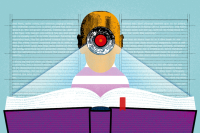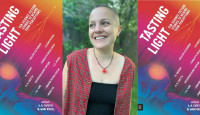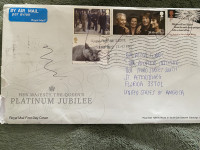
Want to be a writer? This bleak but buoyant guide says to get used to rejection
npr.org – Wednesday February 15, 2023

"No whining."
That's one of Stephen Marche's refrains throughout his provocative essay called On Writing and Failure. As a writer himself, Marche would never deny that writing is hard work: He well knows that writing for a living is fatiguing to the brain and tough on the ego and that the financial payoff is overwhelmingly dismal. But, by repeatedly saying, "No whining," Marche is telling aspiring writers, in particular, to "get used to it."
His aim in this little book is to talk about "what it takes to live as a writer, in air clear from the fumes of pompous incense." And what it takes, in Marche's view, is to have no illusions about the certainty of failure. Even beyond talent or luck, Marche argues, the one thing a writer needs to get used to is failing, again and again.

AI is better at writing poems than you’d expect. But that’s fine.
washingtonpost.com – Tuesday February 14, 2023

In 1950, computer scientist Alan Turing famously proposed what we now call the Turing test of artificial intelligence, which says that a machine might be “thinking” if it can pass as human in a typewritten chat. Even if you’re familiar with this story, you might not know that Turing imagined starting his test with a literary request: “Please write me a sonnet on the subject of the Forth Bridge.” He predicted an evasive but very human response from some future computer: “Count me out on this one. I never could write poetry.” That’s just what my dad would say.
Last week, I sent the same request to ChatGPT, the latest artificial-intelligence chatbot from OpenAI. “Upon the Firth of Forth, a bridge doth stand,” it began. In less than a minute, the program had created in full a rhyming Shakespearean sonnet. With the exception of offensive or controversial topics that its content filters block, ChatGPT will compose original verse on any theme: lost love, lost socks, jobs lost to automation. Tools like ChatGPT seem poised to change the world of poetry — and so much else — but poets also have a lot to teach us about artificial intelligence. If algorithms are getting good at writing poetry, it’s partially because poetry was always an algorithmic business.

Tips and Resources for Writing Your First Sci-Fi/Fantasy Novel
theportalist.com – Sunday February 12, 2023

These books helped me learn about story structure, characterization, and the most important aspect of writing: persistence.
Like many writers, my very first attempt to write a novel began with one scene. I saw dust motes floating through sunbeams, framing a woman sitting at a bar made of antique wood. Over the years, I’d wonder about that woman. Who was she? Why was she sitting at a bar all alone with nothing but trickles of sunlight to keep her company?
These are the kinds of questions and images that set authors on the journey of writing. But the more I tried to figure out who she was, what the story was, the more elusive it all became. This woman became the symbol of my creativity. Sitting in isolation, stuck in a liminal backdrop that refused to budge. The encouraging voices telling me I could write and should pursue it were drowned by a much louder, far more formidable force: doubt.

A.R. Capetta’s Top Ten Tips For Writing Speculative Short Stories
i0.wp.com – Sunday February 12, 2023

To celebrate the release of their sensational new YA sci-fi anthology, Tasting Light: Ten Science Fiction Stories to Rewire Your Perception, co-editor A.R. Capetta, shares their top ten tips for writing speculative short stories.
1. Write that first draft as quickly as you can get it down—without giving yourself time to judge it. If your story involves worldbuilding or even research, like many of the science and tech-inspired stories in Tasting Light, you can do that beforehand and layer in more afterward. But as you write a first draft try not to interrupt your brainwaves while they’re chasing the single, brilliant beam of light that is your idea.
2. Speaking of light! A great speculative short story is like a beam of light that’s gone through the facet of a prism. It is focused and transforming. As part of your writing process, read some of your favorite SFF stories. Look for the focus. Look for transformation—both in the story itself and in how it changes things for the reader.

One brash request, 7 books, and 34 bits of advice for writers
poynter.org – Thursday February 9, 2023

How a whimsical invitation featuring the Rolling Stones and a Shelley poem led to some essential writing advice.
Early in October I received a small package from England, which looked most interesting even before I opened it. The envelope celebrated “Her Majesty the Queen’s PLATINUM JUBILEE.” Five stamps carried the postage, each with a distinctive image: Soldiers from World War II; three lines from my favorite Percy Bysshe Shelley poem, “To a Skylark”; four members of the Rolling Stones; and a gray cat with its eyes closed.
When I flipped it over, it was sealed with a Mick Jagger stamp and a handwritten note: “He also can’t get no satisfaction …”
I was intrigued. Whoever sent this seemed to know something about my interests and sensibilities. The sender was a writer named Paul Khanna. He described himself as a scribe who was, like Jagger, not getting satisfaction from his work; no mention of his acting career. He had written three diet books and had taken a course on screenwriting during the pandemic. He experienced personal setbacks. Both parents suffered serious illnesses and his cat went blind. (I thought of that stamp of a gray cat with its eyes closed.)
What did he want from me? It turns out he had read two of my books and found them helpful. He then caught a notice of my new book, “Tell It Like It Is: A Guide to Clear and Honest Writing,” due out April 11. He wanted a preview copy. “Just like the Apollo 13 which launched on that day,” he wrote, “I’m feeling lost in space and can’t wait to find my way home.”

Mysteries Contained Therein: In Praise of the Literary Journal Longform Interview
lithub.com – Sunday February 5, 2023

“I’ve never consciously strategized about how to make a sentence, let alone a poem. But I can see, even in the earliest poems, that my way of making a sentence involves enacting the push and pull of my interior life, a way of approaching a statement while also making room for its opposite.” In the year since the poet Carl Phillips wrote those lines in our conversation for Image, I’ve lingered over their sound and sense. Their wisdom. How we might discover ourselves through syntax.
No literary action is more instructive for me than the longform interview. At Image, we feature one interview per issue: an anchor for the surrounding words and art. I’ve long admired Phillips as a poet, but after our conversation I more fully appreciated his method. Interviews partially reveal the mysteries of process and vision. Literary magazines—spaces where craft and contemplation reside—are the perfect homes for these conversations.

7 Newsletters That Will Improve Your Writing
electricliterature.com – Saturday February 4, 2023

The resurgence of the email newsletter over the past couple of years is great news for writers. So much of our work requires probing our deepest thoughts in isolation, biting our cuticles, staring at cracked paint on the walls. Whether online or IRL, sharing insights and developing community is essential for survival. Subscribing to newsletters by writers, for writers is a way of staying in conversation with peers. Email newsletters can offer emotional support, tips and exercises for improving craft, and resources for getting published that might otherwise be inaccessible, especially to writers beginning their careers. Some even promote community-building by establishing writing challenges and providing platforms for writers to discuss their experiences. The seven newsletters below offer the best of craft and publishing advice, writing prompts, pitch calls, and encouragement and commiseration about the writing life.

What Is Tone in Writing (& Why Is It Important)?
thescriptlab.com – Thursday February 2, 2023

When it comes to learning about the many dynamics of screenwriting, including the key aspect of tone in writing, screenwriters are tasked with reading about the endless go-to elements of screenplays. Some of these elements include structure, conflict, genre, theme, and characterization. Books, workshops, classes, tutorials, and panels focus solely on these vital elements of screenwriting — and rightfully so. However, very little attention is paid to perhaps the most essential ingredient found within all screenplays and their eventual adaptations into movies — tone.
In cinema, the definition of tone is a mystery to most — lost in translation. People debate the difference between tone and mood in relation to the cause-and-effect elements of a screenplay. The atmosphere also plays a role in this discussion.
Let’s simplify the definition of cinematic tone, explain why tone is important, and learn how the tone of a screenplay and movie affects its cause and effect.

Woke publishers don’t stand a chance against Jane Austen
telegraph.co.uk – Friday January 27, 2023

This week, during an insomniac night, I was yet again re-reading Persuasion – no one else soothes quite like Jane Austen. Delighting in its colourful characters and gentle humour, I paused when in the final pages I came across two references to property held in the West Indies. How is it this beloved book has escaped the cancel mob, I thought, given that the fictional Mr Smith can be associated with a plantation?

Save the children's
thebookseller.com – Wednesday January 25, 2023

Children’s publishing is in crisis and we need to take a stand for more thoughtful, challenging books.
I felt a jolt of righteous gratitude for the "Today" programme’s coverage last month of the declining attention paid by the media to children’s books and of the effects of the publishing industry’s focus on celebrity authors. How reassuring to hear the BBC acknowledge what many of my colleagues and I consider to be a genuine cultural crisis.
I represent authors who write for children and teenagers. And I think British children’s literature is under threat.
It’s already hard to make money as a writer (the Authors’ Licensing and Collecting Society Authors’ Earnings report makes this plain); it’s even harder for children’s writers. The recommended retail price of a children’s novel is rarely higher than £7.99; publishers sell the majority of children’s books to retailers at high retail discounts, earning authors decreased royalties. For most authors, advances have been stagnant for years; very few break the £20,000 ceiling, and most don’t get nearly that much. It is nearly impossible for writing children’s books to be a full-time career, particularly for authors who don’t already have the support of socioeconomic privilege.
Get the free newsletter | Submit a news item or article | Get Writers' News for your website





